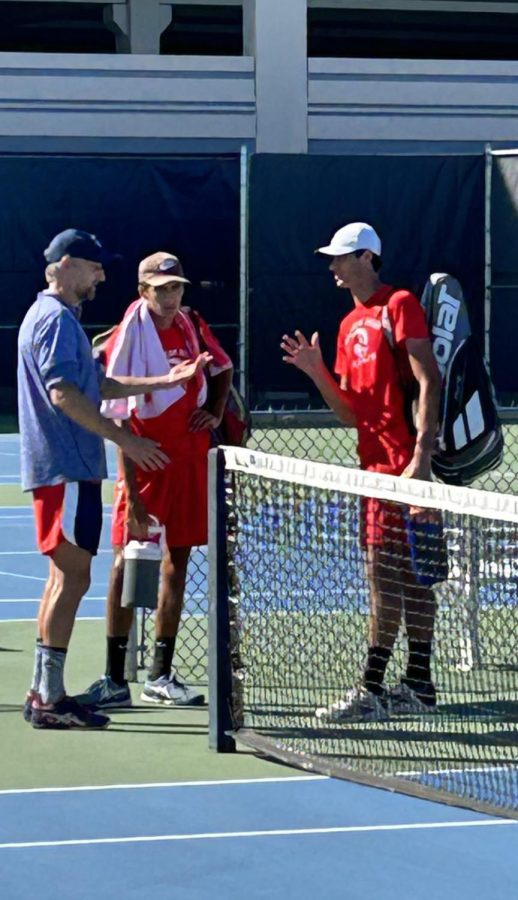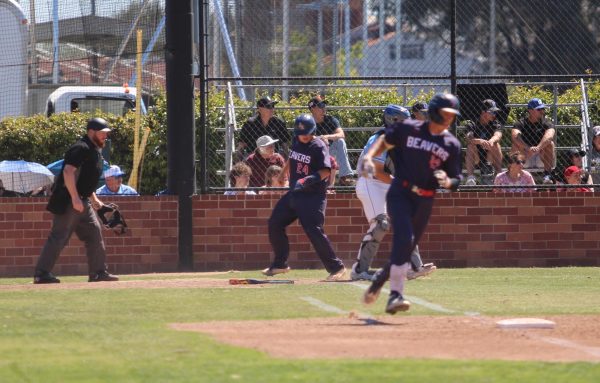The Intercollegiate Tennis Association tournament at ARC sets off a year of tennis
The players honed their skills in the year’s first competition
The Intercollegiate Tennis Association held its annual community college men’s and women’s Northern California regional championship tournament at American River College from Sept. 30 – Oct. 2, which was attended by colleges across the state.
ARC men’s tennis player, Ravi Nelson, won the men’s open singles against Glendale Community College’s David Martirosian, 7-5, 6-2.
“I played David last season, and I went into [this match] knowing his level, and I tried to match it, if not do a little better, and I feel like that’s exactly what I did,” Nelson said.
Nelson, along with Spencer Hill, took first place in men’s open doubles against Sage Nguyen and Lucas Specht of Bakersfield College, playing an eight game pro set, with a final score of 8-2.
In women’s open singles, ARC’s Carla Montaruli advanced to the semifinals, but lost to Greta Krueger of Bakersfield College 7-6 (4), 7-6 (4), and Abigail Prokter of West Valley College prevailed in the final to defeat Krueger 6-1, 6-3.
In women’s open doubles, ARC’s Laney Reddick and Montaruli squared off with Sofia Mazzola and Cassandra Rhoades of Sierra College in the semi-finals, but were defeated 8-5. The Sierra College duo then faced Denise Feria and Katelyn Crismon of Solano Community College, with SCC finishing 9-7 in the final.
Reddick shut out Sara Vargas of Bakersfield College in her first open singles set of the tournament, but felt pressure in the second set when she was down by two games. Matt Brunnquell, ARC women’s assistant coach, was there to calm nerves and help get Reddick back on track.
“Laney was disappointed over some shots she missed,” Brunnquell said. “I was trying to help her close out the match. You’re going to see them get nervous no matter what.”
Reddick kept things in perspective. She ultimately succeeded against Vargas with a score of 6-0, 6-2.
“I feel proud,” Reddick said. “You can lose a game and then get back to zero. Keep looking for the next ball, win or lose.”
This is the first tennis tournament of the year for ARC. Steven Dunmore, women’s head coach, spoke with regards to strategy.
“This is an opportunity for newer players to get their feet wet. Our players need to learn to expose players’ weaknesses,” Dunmore said. “We need to get to the net and bring our opponents to the net. So, tactically, these will be our areas of focus.”
According to Dunmore, knowing the mental and emotional side of tennis is key to competitiveness. A lot of practice time is spent on that, especially with the new players who don’t often join the team with that knowledge.
“It’s a learned skill. Some are better at [the mental and emotional skills] than others,” Dunmore said. “If a player is down in a match, the match can be turned around. It’s a skill that can be learned.”
Bobak Jabery-Madison, men’s head coach, says he works hard to instill in his team the importance of preparation, purpose and passion.
“It’s easy to get distracted, to have nerves in competition,” Jabery-Madison said. “We don’t want to play blindly. We want everything we do to have a reason. The way we condition, the way we train is important, so when match time comes, we’re ready for situations; whatever needs to be done.”
Ravi Nelson’s mother, Bonnie Nelson, credits Jabery-Madison with helping her son improve his tennis game.
“He now brings a lot of consistency, belief and discipline to the game, and I think [Jabery-Madison’s] coaching has really helped,” Nelson said.
The ITA tournament was the first of many for ARC men’s and women’s tennis this school year.
“We have high expectations,” Dunmore said. “These players are going to look very different and be playing at a much higher level by April of next year. We’re very encouraged.”












